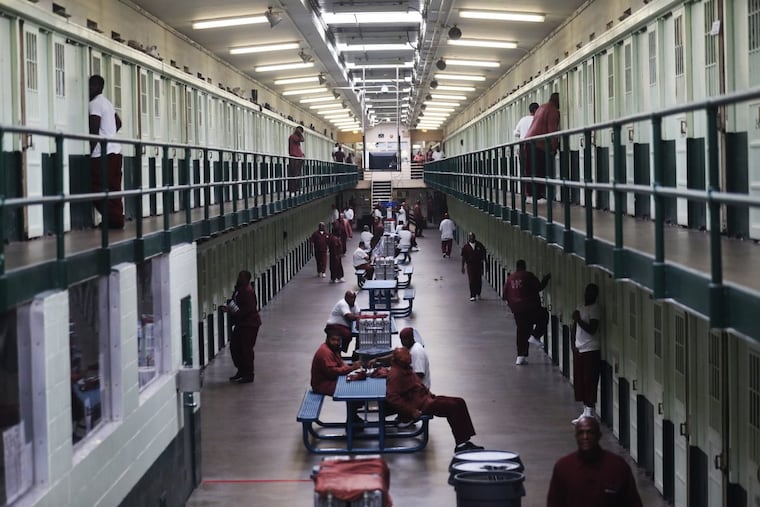Pennsylvania's newest, most expensive prison is finally ready - and inmates are dreading it
Many inmates have for years dreaded the relocation. But the past few months have been a particularly stressful time at Graterford, which saw five suicides and the resignation of the superintendent. Now, inmates have learned some beloved programs will not be making the transition.

Years after Pennsylvania's newest, biggest, and most expensive prison, State Correctional Institution Phoenix, was slated for completion, certificates of occupancy have at long last been issued for the entire $400 million, 3,830-bed complex in Montgomery County.
The move from Graterford Prison finally seems imminent. Staff have packed up their offices. And the men currently housed at Graterford, which Phoenix will replace, have been issued two moving boxes each.
"All the shops are shut down; the machinery is out. Counselors are living out of boxes in their offices," said Jorge Cintron Jr., an inmate who has called Graterford home for more than a decade. The chapel, he said, has been short on Bibles, because those, too, were boxed up.
Though Department of Corrections officials have declined to provide an official move-in date, they previously said Phoenix, next door to Graterford, was scheduled to open by June 30, the end of the state's fiscal year.
For those who've lived at Graterford for decades, it has so far been an uneasy transition.
Many inmates have long dreaded the relocation from the 95-year-old Graterford to a modern prison with enhanced security and surveillance measures, and cellmates for men who've had cells to themselves for years. But the last few months have been a particularly stressful time at Graterford, which saw five suicides and the resignation of the superintendent.
Now, inmates have learned some programs may not be making the move.
Nancy Wolff, a professor at Rutgers University who has been volunteering 20 hours a week at Graterford, said she learned abruptly she would not be able to stay on. Over six years, she had implemented mindfulness-based stress reduction programs, trauma-focused therapy groups, volunteer training, a drumming program for emotional literacy, and yoga for stress reduction.
"I was told there was no space available at Phoenix for the contributions that I make," said.Wolff, whose research has focused on incarceration and rehabilitation. "These were free resources that assisted in preparing people to return to the community with less anger and better skills to live pro-socially."
A Department of Corrections spokeswoman, Susan McNaughton, said that volunteers were merely advised that their programs would have to stop temporarily and that, though they could resume after the move, they may not have designated space in the new prison.
The organizers of Songs in the Key of Free, the first formal music program at Graterford in more than a decade, also understood that their program had been terminated. They were scrambling to finish recording an album of original music written and performed by inmates in these final weeks.
"We're told that our last day is May 21," said August Tarrier, a founder of the program. "We're just heartbroken."
She said they were told they might be able to ask permission to resume their program in six to eight months. However, McNaughton said Songs in the Key of Free would be able to resume after the move.
Questions about future programming have further increased anxiety around the move, Wolff said.
Since last year, she has supported a "Healthy Change" group, a coalition of longtime prisoners that met with Corrections Secretary John Wetzel in hope of facilitating the transition. In a memo drafted by eight of those inmates last September, the men pleaded for better communication about their future living conditions, counseling for inmates distressed by the move, and supports for elderly or infirm inmates who worried about possible top-bunk assignments or other physical challenges.
"The horror stories about where we will live build by the day. This is very stressful," they wrote, citing rumors about sinking and flooded buildings and broken plumbing at Phoenix. Wolff said there was no response.
Tyrone Werts, 67, of Philadelphia, spent 37 years at Graterford before receiving commutation in 2011 and has returned often as a volunteer, meeting with the lifers organization there. He's been told he, too, will have to reapply for access.
"Graterford has always been the vanguard of the prison system and very progressive in terms of rehabilitation, treatment and programs," he said.
During his time at the prison, he said, "volunteers were welcomed, and it was very therapeutic. It benefited the guys. It benefited me personally. I don't know what my life would be like if I had not had the opportunity to engage with volunteers."
He recalled feeling anxious about the move to Phoenix himself, back when it was announced a decade ago. Now, it feels real.
"Graterford was like a community," he said. "I feel bad for them, moving to a place where nobody knows what's going to happen."